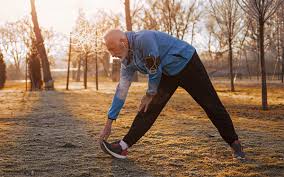Aging Well Through Exercise

Advances in medicine and technology mean that humans are living longer than ever before. But are we aging well?
If we are living longer, it stands to reason that we should be healthier to have the best possible quality of life as we age. A growing body of published research demonstrates how exercise can help us achieve this goal. These studies show that regular exercise throughout life can improve our health as we age.
Science proves the lifelong benefits of exercise
Researchers at Northwestern University Feinberg School of Medicine have published a study that found that when older adults spend an hour a week doing moderate- to vigorous-intensity exercise, they have less pain. That means a brisk walk of just 10 minutes a day can have a positive effect on joint pain and loss of mobility.
For nearly 20 years, researchers followed adults ages 49 to 83 who had knee osteoarthritis and were at risk for developing mobility problems as they aged. The participants had already experienced pain in their hip, knee, ankle or foot and were at increased risk of disability because of their symptoms, including pain or stiffness. The study found that, despite being at a disadvantage with their existing condition, people who exercised regularly had less pain and less difficulty doing everyday tasks.
Exercise also improves quality of life because it can improve mobility and reduce the risk of injuries from falls as we age. For many, this means greater independence and the ability to take care of ourselves as we age, which is very important to many people.
Author Dorothy Dunlop explains that “by setting an evidence-based physical activity goal that supports these core (mobility) abilities, inactive older adults can be motivated to enjoy the health benefits of an active lifestyle.” It may not always be easy to commit to regular or daily exercise, but incorporating short bursts of “natural” movement into our routines, such as walking as much as possible as part of daily activities and household chores like washing dishes or gardening, can be beneficial.
A study of 122,007 patients looked at the effect of cardiorespiratory fitness on lifespan over a decade. Researchers found that people who exercised had a lower risk of death from any disease. And the more they exercised, the lower their risk of death.
People who do a lot of cardiovascular exercise to improve their cardiorespiratory fitness have a lower risk of developing coronary heart disease, high blood pressure, cancer, diabetes, or having a stroke.
It is important to do exercises that reduce the risk of developing early frailty or disability. This could be functional gymnastics or everyday activities, such as gardening, shopping and housework. You should also do strengthening exercises that slow the aging effects of sarcopenia (muscle loss) and low bone density.
You have power over your genes
Can exercise reduce your risk of cardiovascular disease, even if you have a family history or genetic profile that puts you at risk?
Research shows that exercise can be effective against the genes that put us at higher risk for cardiovascular disease. A study published in the journal Circulation found that strength and cardiorespiratory training (in this case, through regular use of a stationary bike) reduced the risk of cardiovascular disease, whether people were considered to have a low, average, or high genetic risk for cardiovascular disease.
“Genes don’t have to determine our fate,” says Dr. Erik Ingelsson in an article published by the American Heart Association. The study’s lead author and professor of medicine at Stanford University adds that “you can impact your risk, and reduce it, by being more fit.” The study found that the fittest participants at risk for cardiovascular disease were more than twice as likely to be alive 10 years later as the least fit.
Science proves you can start exercising at any age
It’s never too late to start exercising. Fitness studies show that even people who don’t start exercising until middle age see longevity benefits similar to those who started exercising at a younger age. A study conducted by the National Cancer Institute in Bethesda, Maryland, found that people who reported high, consistent levels of exercise from a young age through middle age were 36 percent less likely to die from any cause during the study period compared with people who were inactive throughout their lives.
But inactive people who started exercising later, between ages 40 and 61, experienced similar benefits. And when inactive people started exercising in middle age, they were 35% less likely to die from any cause during the study than if they had remained inactive.
Study leader Pedro Saint-Maurice says, “These findings suggest that if you’re active in early adulthood, stay active. Don’t stop. [But] if you’re in your 40s, 50s, or 60s and you haven’t been active for a long time, it’s not too late to start exercising now.”
Health is the ultimate wealth
Getting regular exercise and feeling less of some of the aches and pains that come with age might be reason enough to enjoy going to the gym or going for a bike ride. And staying fit also helps improve your mood.
In a joint study published in The Lancet , researchers from Yale and Oxford universities concluded that exercise, whether it’s mowing the lawn or lifting weights, makes people happier. By assessing the income, physical behavior and mood of more than 1.2 million participants, the researchers found that people who stayed active tended to be happier than those who didn’t exercise, even though the latter earned significantly more per year.
Health is the ultimate wealth, and living a long, happy, healthy life is more important to most people than making more money at work. Because all the money in the world can’t give you the feeling of health and well-being that comes from taking care of your body.



